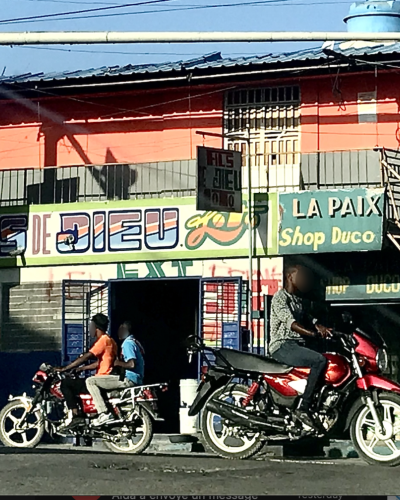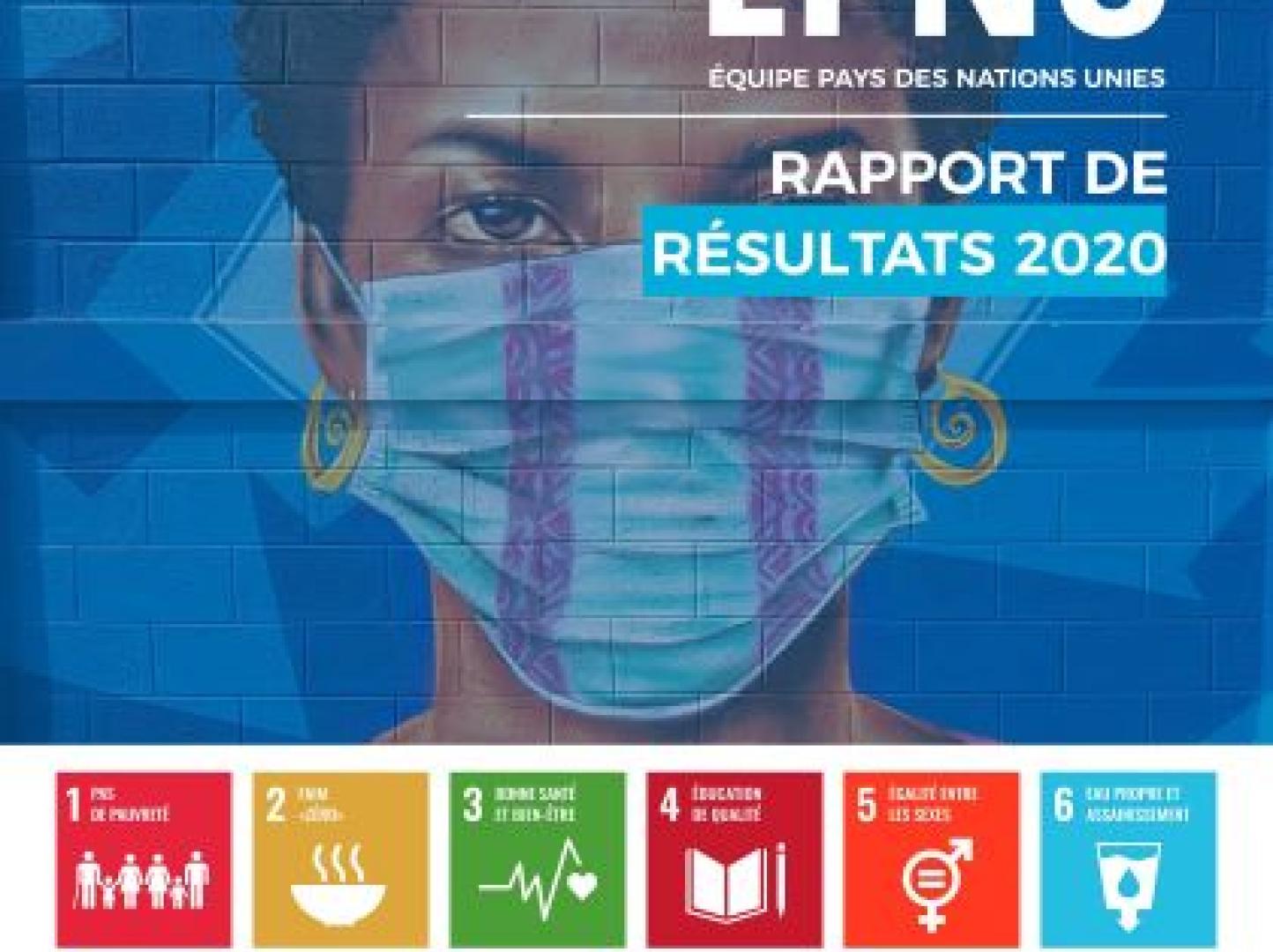Sexual violence in Port-au-Prince: a weapon used by gangs to instill fear

In early July 2022, Rose, 25 years old, was one of at least 52 women and girls who were collectively raped by armed elements during a week of intense violence opposing two rival gang coalitions in Cité Soleil.
In the afternoon of 7 July 2022, Rose, a mother of four and five-months pregnant, was severely beaten and raped, in the presence of her children, by three heavily armed masked men. The latter had forced their way into her home during an attack launched against the residents of Brooklyn, in Cité Soleil. Earlier that day, Rose’s husband had been shot dead by members of the same gang. Before leaving, the armed individuals set her house ablaze, forcing Rose and her children to sleep out in the open in a public space for many nights.
The story of Rose, like that of many other women, illustrates the ordeal of victims of sexual violence who are targeted by armed gangs.
This report, jointly published by the United Nations Integrated Office in Haiti (BINUH) and the Office of the United Nations High Commissioner for Human Rights (OHCHR), shows how armed gangs have used rape, including collective rapes, and other forms of sexual violence to instill fear, punish, subjugate, and inflict pain on local populations with the ultimate goal of expanding their areas of influence, throughout the metropolitan area of Port-au-Prince. As of August 2022, large swathes of the capital, accounting for at least 1.5 million people, were reportedly under the control or the influence of gang elements.
Gangs are able to commit acts of sexual violence and other human rights abuses mainly because of widespread impunity and ease of access to high caliber weapons and ammunitions trafficked from abroad.
Women, girls and boys of all ages, as well as to a lesser extent men, have been victims of ruthless sexual crimes. Children as young as 10 and elderly women were subjected to collective rapes for hours in front of their parents or children by more than half a dozen armed elements during attacks against their neighborhoods. Viewed as enemies for their real or perceived support to rival gangs, or for the simple fact of living in the same areas as those rival gangs, some of these victims were mutilated and executed after being raped.
Gangs have also resorted to sexual violence as a weapon to disrupt the social fabric by targeting women and girls crossing “frontlines” or moving across neighborhoods on foot or in public transport to carry out their daily livelihood activities, such as going to work, to marketplaces or to schools.
Sexual violence is also used by armed elements to bolster their position of power. Rape or the threat thereof is frequently used against kidnapped women and girls to press their families to pay ransom. Even though gangs usually present themselves as defenders of the communities under their control, their elements often coerce young women, girls and sometimes men, viewed as sexual objects, into becoming their sexual “partners”. Furthermore, in these impoverished and marginalized areas, women and girls may also be encouraged by their own families to have non-consensual intercourse with gang elements in exchange for in-kind benefits, such as food, drinking water, and other material gains, as well as “protection” from abuses committed by other armed men.
Impunity remains the norm for the vast majority of cases of sexual violence perpetrated by gangs. Some victims reported that they also preferred returning to work and trying to resume a “normal life” as a self-protection mechanism for their relatives and themselves, instead of initiating any legal action. Contributing factors for the lack of accountability are the deficiency of rule of law institutions and widespread insecurity. In this context, the specialized police units have not been able to meaningfully address sexual crimes involving gang elements due to structural challenges such as insufficiency of resources and lack of gender sensitivity. Institutional weakness is compounded by the fact that the two main courthouses of the capital, in downtown Port-au-Prince and in the commune of Croix-des-Bouquets, were attacked, raided and ransacked by armed gangs in June and August 2022, respectively.
Ensuring immediate access to adequate medical and psychosocial care to prevent further physical and psychological harm should constitute a crucial first step towards victims’ rehabilitation. However, the efforts of national and international actors working in this field to guarantee the rights of survivors have generally been insufficient due to multiple challenges and barriers.
Overall, the Haitian health system is ill-prepared and poorly equipped to respond to the basic health needs of its population, let alone to provide specialized medical care for victims of sexual violence. This is particularly evident in cases involving severe and traumatic injuries from collective vaginal and anal rapes. In addition, due to gang-related violence, victims generally do not have access to available post-rape treatment kits which must be administered within a window period of 72 hours after the aggression, which exposes them to a higher risk of contracting HIV or sexually transmitted diseases and to unwanted pregnancies. This same violence has also had a detrimental impact on health care workers, who have been attacked and/or kidnapped while performing their duties.
The persistent blockage of the main roads by armed gangs and the chronic shortage of fuel have also had a negative effect on the normal functioning of basic services, including healthcare centers. According to the latest information available, the fuel crisis triggered in late August by the latest movement of mass protests, still ongoing at the time of publication, had caused 50% of the main hospitals across the country to cease delivering emergency healthcare services as usual, and 60% of internal medicine, pediatric, surgery and obstetric services had also been severely disturbed nationwide.
Another major challenge relates to the lack of psychosocial care to address the mental health consequences of sexual violence. These consequences can be severe and long-lasting, particularly when sexual violence has been used with the purpose of inflicting individual or collective trauma. In Port-au-Prince, there are very few specialized psychologists, and access to mental health care is widely insufficient. Coupled with the social stigma associated with sexual violence, this situation leads victims to suffer in silence since very few of them dare to come forward and disclose what they have endured.
Victims, who suffer from trauma and stigma from their own communities, are often compelled to remain in the area where they were attacked due to a lack of financial means to move somewhere else. Shelter programs providing safe habitable housing, as well as victim reintegration and rehabilitation support, outside gang-controlled areas are very rare. As a result, there is very limited data on the extent and impact of sexual violence involving armed gang elements.
In light of this extremely bleak picture, the United Nations Security Council, in its resolution 2645 (2022), which extended the mandate of BINUH in July 2022, expressed grave concerns about the extremely high levels of gang violence and sexual and gender-based violence, as well as ongoing impunity for perpetrators. In this resolution, the UN Security Council also decided to strengthen the capacity of BINUH to help national authorities to prevent and respond to sexual and gender-based violence
The Security Council also called upon Member States to prohibit the transfer of small arms, light weapons, and ammunition to non-State actors engaged in or supporting gang violence criminal activities, or human rights abuses. It also expressed its readiness to take appropriate measures, including assets freeze or travel ban measures, against those engaged in or supporting gang violence, criminal activities, or human rights abuses.
It is important to recall that the primary responsibility to protect and fulfil the rights of victims of sexual violence lies with state authorities. Although the ongoing armed violence may reduce available resources, this does not exonerate the Haitian authorities from taking the necessary steps to achieving the realization of a minimum core obligations of the right to health and provide effective remedy and reparations for victims.
Given the wide range of challenges faced by victims of sexual violence to seek justice and reparations, and even merely to overcome what they have survived, support to Haitian authorities in fulfilling their obligations is essential. As enhanced joint efforts are required by national and international actors, BINUH and OHCHR propose the following key and achievable recommendations to the national authorities, medical and/or psychosocial service providers, and international actors:
- To public, private and non-governmental service providers and civil society organizations with the support of the United Nations, develop awareness campaigns and other sensitizations measures to stop sexual violence used by armed gangs as a means to instill fear in the population.
- To service providers in coordination with national authorities and with the support of bilateral and multilateral donors, strengthen the availability, accessibility, and quality of medical and psychosocial care facilities for survivors of sexual violence linked to gangs, including through increased and sustained funding and support for organizations that provide medical and psychological care to victims.
- To service providers with the support of bilateral and multilateral donors, prioritize support for accessible and inclusive shelter programs that include reinsertion options for survivors. Ensure in this regard that rapid and flexible financing is available to implementing partners.
- To the Haitian National Police with the support of the United Nations, strengthen coordination efforts among relevant units within the Haitian National Police working on sexual violence, protection of minors and kidnappings, through the establishment of a coordination mechanism, and joint training and investigations.
- To the Haitian Ministry of Justice and Public Security with the support of the international community establish a judicial task force to address impunity for crimes of sexual violence.
- To national authorities with the assistance of countries in the region, support law enforcement authorities to tackle the smuggling and uncontrolled circulation of illicit weapons and ammunition, as these are one of the main enablers of gang violence, including sexual violence.







